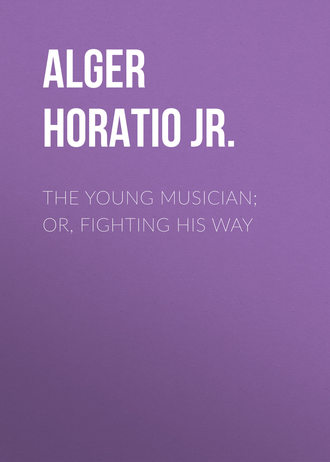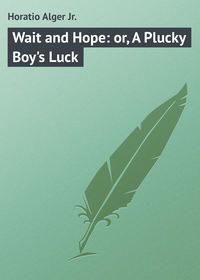
The Young Musician; Or, Fighting His Way
“Oh, what a rascal he was!” ejaculated the boy. “I guess he’s been robbing a safe. I wonder how much is here?”
He was tempted to sit down on the grass and count the bills, but he was prevented by the thought that the professor might discover his loss, and returning upon his track, question him as to whether he had found it. Sam determined that he wouldn’t give it up, at any rate.
“I guess I could wrastle with him,” he thought. “He looks rather spindlin’, but then he’s bigger than I am, and he might lick me, after all.”
I desire to say emphatically that Sam was strictly honest, and never for a moment thought of appropriating any of the money to his own use. He felt that as a detective he had been successful, and this made him feel proud and happy.
“I may as well go home,” he said. “If he’s stolen this money from Mr. Perry, I’ll come in for a reward.”
Sam did not hurry, however. He was not now in pursuit of any one, and could afford to loiter and recover his breath.
Meanwhile, Professor Riccabocca, in happy unconsciousness of his loss, continued his run to the station. He arrived there breathless, and hurried to the ticket-office.
“Give me a ticket to Chambersburg,” he said.
“All right, sir. Ninety cents.”
If Riccabocca had been compelled to take out his wallet, he would at once have discovered his loss, and the ticket would not have been bought. But he had a two-dollar bill in his vest, and it was out of this that he paid for the ticket to Chambersburg. Armed with the ticket, he waited anxiously for the train. He had five minutes to wait—five anxious moments in which his flight might be discovered. He paced the platform, looking out anxiously for the train.
At length he heard the welcome sound of the approaching locomotive. The train came to a stop, and among the first to enter it was the eminent elocutionist. He took a seat beside the window looking out toward the village. What did he see that brought such an anxious look in his face?
A buggy was approaching the depot at breakneck speed. It contained Mr. Gates, the landlord, and the young musician. Mr. Gates was lashing the horse, and evidently was exceedingly anxious to arrive at the depot before the train started.
Beads of perspiration stood on the anxious brow of the professor. His heart was filled with panic terror.
“The girl must have told them of my flight,” he said to himself. “Oh, why didn’t I think to give her a quarter to keep her lips closed? Why doesn’t the train start?”
The buggy was only about ten rods away. It looked as if Philip and his companion would be able to intercept the fugitive.
Just then the scream of the locomotive was heard. The train began to move. Professor Riccabocca gave a sigh of relief.
“I shall escape them after all,” he said triumphantly, to himself.
He opened the window, and, with laughing face, nodded to his pursuers.
“We’ve lost him!” said Philip, in a tone of disappointment. “What can we do?”
“Find out where he is going, and telegraph to have him stopped,” said Mr. Gates. “That will put a spoke in his wheel.”
CHAPTER XXXIII. THE LOST WALLET
Mr. Gates was acquainted with the depot-master, and lost no time in seeking him.
“Too late for the train?” asked the latter, who observed in the landlord evidences of haste.
“Not for the train, but for one of the passengers by the train,” responded the landlord. “Did you take notice of a man dressed in a shabby suit of black, wearing a soft hat and having very long black hair?”
“Yes.”
“Where is he going?” asked Mr. Gates eagerly.
“He bought a ticket for Chambersburg.”
“Ha! Well, I want you to telegraph for me to Chambersburg.”
The station-master was also the telegraph-operator, as it chanced.
“Certainly. Just write out your message and I will send it at once.”
Mr. Gates telegraphed to a deputy sheriff at Chambersburg to be at the depot on arrival of the train, and to arrest and detain the professor till he could communicate further with him.
“Now,” said he, turning to Philip, “I think we shall be able to stop the flight of your friend.”
“Don’t call him my friend,” said Philip. “He is anything but a friend.”
“You are right there. Well, I will amend and call him your partner. Now, Mr. de Gray—”
“My name is Gray—not de Gray. The professor put in the ‘de’ because he thought it would sound foreign.”
“I presume you have as much right to the name as he has to the title of professor,” said Gates.
“I don’t doubt it,” returned Philip, smiling.
“Well, as I was about to say, we may as well go back to the hotel, and await the course of events. I think there is some chance of your getting your money back.”
When they reached the hotel, they found a surprise in store for them.
Sam had carried the professor’s wallet to Mr. Perry, and been told by them to wait and hand it in person to Philip and his friend, Mr. Gates, who were then at the depot.
When they arrived, Sam was waiting on the stoop, wallet in hand.
“What have you got there, Sam?” asked Mr. Gates, who often came to Knoxville, and knew the boy. “It’s the wallet of that man you were after,” said Sam.
“How did you get it?” asked Philip eagerly.
“I chased him ‘cross lots,” said Sam.
“You didn’t knock him over and take the wallet from him, did you, Sam?” asked Mr. Gates.
“Not so bad as that,” answered Sam, grinning. “You see, he tripped over a big rock, and came down on his hands and knees. The wallet jumped out of his pocket, but he didn’t see it. I picked it up and brought it home.”
“Didn’t he know you were chasing him?”
“I guess not. He never looked back.”
“What made you think of running after him?”
“One of the girls told me to. The way he ran out of the back door made her think there was something wrong.”
“Suppose he had turned round?”
“I guess I could have wrastled with him,” said Sam, to the amusement of those who heard him.
“It is well you were not obliged to.”
“Who shall I give the wallet to?” asked Sam.
“Mr. Gray, here, is the professor’s partner, and half the money belongs to him. You can give it to him.”
“Have I a right to take it?” asked Philip, who did not wish to do anything unlawful.
He was assured that, as the business partner of the professor, he had as much right as Riccabocca to the custody of the common fund.
“But half of it belongs to the professor.”
“He’ll come back for it, in the custody of the sheriff. I didn’t think I was doing the man a good turn when I telegraphed to have him stopped.”
The first thing Philip did was to take from his own funds a five-dollar bill, which he tendered to Sam.
“Is it all for me?” asked the boy, his eyes sparkling his joy.
“Yes; but for you I should probably have lost a good deal more. Thank you, besides.”
And Philip offered his hand to Sam, who grasped it fervently.
“I say, you’re a tip-top chap,” said Sam. “You ain’t like a man that lost a pocketbook last summer, with a hundred dollars in it, and gave me five cents for finding it.”
“No; I hope I’m not as mean as that,” said Philip, smiling.
He opened the wallet and found a memorandum containing an exact statement of the proceeds of the concert. This was of great service to him, as it enabled him to calculate his own share of the profits.
The aggregate receipts were one hundred and fifty dollars and fifty cents. Deducting bills paid, viz.:
Rent of hall........................ $5.00
Printing, etc........................ 5.00
Bill-poster......................... 1.00
Total...........................$11.00
there was a balance of $138.50, of which Philip was entitled to one-half, namely, $69.25. This he took, together with the eleven dollars which he had himself paid to the creditors of the combination, and handed the wallet, with the remainder of the money, to Mr. Perry, landlord of the Knoxville Hotel, with a request that he would keep it till called for by Professor Riccabocca.
“You may hand me three dollars and a half, Mr. Perry,” said Mr. Gates. “That is the amount the professor owes me for a day and three-quarters at my hotel. If he makes a fuss, you can tell him he is quite at liberty to go to law about it.”
Meanwhile, where was the professor, and when did he discover his loss?
After the train was a mile or two on its way he felt in his pocket for the wallet, meaning to regale himself with a sight of its contents—now, as he considered, all his own.
Thrusting his hand into his pocket, it met—vacancy.
Pale with excitement, he continued his search, extending it to all his other pockets. But the treasure had disappeared!
Professor Riccabocca was panic-stricken. He could hardly suppress a groan.
A good woman sitting opposite, judging from his pallor that he was ill, leaned over and asked, in a tone of sympathy:
“Are you took sick?”
“No, ma’am,” answered the professor sharply.
“You look as if you was goin’ to have a fit,” continued the sympathizing woman. “Jest take some chamomile tea the first chance you get. It’s the sovereignest thing I know of—”
“Will chamomile tea bring back a lost pocket-book?” demanded the professor sharply.
“Oh, Lor’! you don’t say you lost your money?”
“Yes, I do!” said Riccabocca, glaring at her.
“Oh, dear! do you think there’s pickpockets in the car?” asked the old lady nervously.
“Very likely,” answered the professor tragically.
The good woman kept her hand in her pocket all the rest of the way, eyeing all her fellow passengers sharply.
But the professor guessed the truth. He had lost his wallet when he stumbled in the field. He was in a fever of impatience to return and hunt for it. Instead of going on to Chambersburg, he got out at the next station—five miles from Knoxville—and walked back on the railroad-track. So it happened that the telegram did no good.
The professor walked back to the hotel across the fields, hunting diligently, but saw nothing of the lost wallet. He entered the hotel, footsore, weary, and despondent. The first person he saw was Philip, sitting tranquilly in the office.
“Did you just come down from your room?” asked our hero coolly.
“I am a most unfortunate man!” sighed Riccabocca, sinking into a seat.
“What’s the matter?”
“I’ve lost all our money.”
“I am glad you say ‘our money.’ I began to think you considered it all yours. Didn’t I see you on the train?”
“I had a bad headache,” stammered the professor, “and I didn’t know what I was doing.”
“Does riding in the cars benefit your head?”
Professor Riccabocca looked confused.
“The wallet was found,” said Philip, not wishing to keep him any longer in suspense.
“Where is it?” asked the professor eagerly.
“Mr. Perry will give it to you. I have taken out my share of the money, and Mr. Gates has received the amount of his bill. It would have been better for you to attend to these matters yourself like an honest man.”
Professor Riccabocca was so overjoyed to have back his own money that he made no fuss about Philip’s proceedings. Indeed, his own intended dishonesty was so apparent that it would have required even more assurance than he possessed to make a protest.
CHAPTER XXXIV. A NEW BUSINESS PROPOSAL
Professor Riccabocca put the wallet in his pocket with a sigh of satisfaction. There were still sixty dollars or more in it, and it was long since he had been so rich.
He began to think now that it might be well to revive the combination. There was some doubt, however, as to how Philip would receive the proposal.
He looked at his young partner and was not much encouraged. He felt that he must conciliate him.
“Mr. de Gray,” he began.
“Call me Gray. My name is not de Gray.”
“Well, Mr. Gray, then. I hope you don’t have any hard feelings.”
“About what?” inquired Philip, surveying the professor curiously.
“About—the past,” stammered the professor.
“You mean about your running off with my money?” returned Philip plainly.
Professor Riccabocca winced. He did not quite like this form of statement. “I am afraid you misjudge me,” he said, rather confused.
“I shall be glad to listen to any explanation you have to offer,” said our hero.
“I will explain it all to you, in time,” said the professor, recovering his old assurance. “In the meantime, I have a proposition to make to you.”
“What is it?”
“Suppose we give an entertainment in Knoxville—on the same terms as the last.”
“I shouldn’t think you would like to appear before an audience here, Professor Riccabocca.”
“Why not?”
“Before night everybody will have heard of your running away with the proceeds of the last concert.”
“Public men are always misjudged. They must expect it,” said the professor, with the air of a martyr.
“I should think you would be more afraid of being justly judged.”
“Mr. Gray,” said the professor, “I have done wrong, I admit; but it was under the influence of neuralgia. When I have a neuralgic headache, I am not myself. I do things which, in a normal condition, I should not dream of. I am the victim of a terrible physical malady.”
Philip did not believe a word of this, but he felt amused at the professor’s singular excuse.
“Come, Mr. Gray, what do you say?”
“I think I must decline,” returned Philip.
But here Professor Riccabocca received unexpected help.
Mr. Perry, the landlord, who had listened to the colloquy, approached the two speakers and said:
“Gentlemen, I have a proposal to make to you both.”
Both Philip and the professor looked up, with interest.
“Some of the young men in the village,” said the landlord, “have formed a literary club, meeting weekly. They have hired and furnished a room over one of our stores, provided it with, games and subscribed for a few periodicals. They find, however, that the outlay has been greater than they anticipated and are in debt. I have been talking with the secretary, and he thinks he would like to engage you to give an entertainment, the proceeds, beyond a fixed sum, to go to the benefit of the club. What do you say?”
“When is it proposed to have the entertainment?” asked Philip.
“I suppose we should have to name to-morrow evening, in order to advertise it sufficiently.”
“I am willing to make any engagement that will suit the club,” said Philip.
“And I, too,” said Professor Riccabocca.
“The secretary authorizes me to offer you ten dollars each, and to pay your hotel expenses in the meantime,” said Mr. Perry.
“That is satisfactory,” said our hero.
“I agree,” said the professor.
“Then I will at once notify the secretary, and he will take steps to advertise the entertainment.”
Ten dollars was a small sum compared with what Philip had obtained for his evening in Wilkesville, but a week since he would have regarded it as very large for one week’s work. He felt that it was for his interest to accept the proposal.
He secretly resolved that if the entertainment should not prove as successful as was anticipated, he would give up a part of the sum which was promised him for his services.
Professor Riccabocca assented the more readily to the proposal, because he thought it might enable him again to form a business alliance with our hero, from whom his conduct had estranged him.
“Suppose we take a room together, Mr. de Gray,” he said, with an ingratiating smile.
“Gray, if you please, professor. I don’t like sailing under false colors.”
“Excuse me; the force of habit, you know. Well, do you agree?”
“The professor has more assurance than any man I ever heard of,” thought Philip. “You must excuse me, professor,” he said. “After what has happened, I should feel safer in a room by myself.”
“Why will you dwell upon the past, Mr. Gray?” said the professor reproachfully.
“Because I am prudent, and learn from experience,” answered Philip.
“I assure you, you will have nothing to complain of,” said Riccabocca earnestly. “If we are together, we can consult about the program.”
“We shall have plenty of time to do that during the day, professor.”
“Then you don’t care to room with me?” said Riccabocca, looking disappointed.
“No, I don’t.”
“What are you afraid of?”
“I am afraid you might have an attack of neuralgic headache during the night,” said Philip, laughing.
Professor Riccabocca saw that it would be of no use for him to press the request, and allowed himself to be conducted to the same room which he had so unceremoniously left a short time before.
During the afternoon, Philip had a call from John Turner, the secretary of the Young Men’s Club. He was a pleasant, straightforward young man, of perhaps twenty.
“We are very much obliged to you, Mr. Gray,” he said, “for kindly consenting to play for our benefit.”
“It is for my interest,” said Philip frankly. “I may as well remain here and earn ten dollars as to be idle.”
“But you made a great deal more, I understand, in Wilkesville?”
“Yes; but I might not be as fortunate here. I had not intended to appear here at all, and should not have done so unless you had invited me. How many have you in your club?”
“Only about twenty-five, so far, and some of us are not able to pay much.”
“How long has your club been formed?” asked Philip.
“Only about three months. We wanted a place where we could meet together socially in the evening, and have a good time. Before, we had only the stores and barrooms to go to, and there we were tempted to drink. Our club was started in the interests of temperance, and we can see already that it is exerting a good influence.”
“Then I am very glad to assist you,” said Philip cordially.
“You must come round and see our room. Are you at leisure now?”
“Yes, Mr. Turner.”
Philip accompanied his new friend to the neatly furnished room leased by the society. He was so well pleased with its appearance that he thought he should himself like to belong to such an association, whenever he found a permanent home. At present he was only a wanderer.
“Our debt is thirty-four dollars,” said the secretary. “You may not think it large, but it’s large for us.”
“I hope our entertainment will enable you to clear it off.”
“If it should it will give us new courage.”
On the evening of the next day Philip and the professor entered the hall engaged for the entertainment, and took seats on the platform.
The hall was well filled, the scale of prices being the same as at Wilkesville.
“Mr. Gray,” whispered the secretary joyfully, “it is a great success! After paying all bills the club will clear fifty dollars.”
“I am delighted to hear it,” said Philip.
The professor commenced the entertainment, and was followed by Philip.
As Philip began to play his attention was drawn to three persons who were entering the hall.
These were a lady, a little girl, and a stout gentleman, in whom Philip, almost petrified with amazement, recognized his old acquaintance, Squire Pope, of Norton, who had shown himself so anxious to provide him a home in the poor-house.
CHAPTER XXXV. SQUIRE POPE IS AMAZED
Though Philip did not know it, it chanced that Squire Pope’s only sister, Mrs. Cunningham, lived in Knoxville. She was a widow, fairly well off, with a young daughter, Carrie—a girl of twelve. Squire Pope had long thought of visiting his sister, and happening about this time to have a little business in a town near-by, he decided to carry out his long-deferred plan. He arrived by the afternoon train, in time for supper.
“I am glad you are here to-night, brother,” said Mrs. Cunningham.
“Why particularly to-night, Sister Ellen?” asked the squire.
“Because there is to be an entertainment for the benefit of the Young Men’s Literary Club. It is expected to be very interesting.”
“What sort of an entertainment, Ellen?” asked the squire.
“The celebrated elocutionist, Professor Riccabocca, is to give some readings—”
“Riccabocca!” repeated the squire, in a musing tone. “I can’t say I ever heard of him.”
“Nor I; but I hear he’s very celebrated.”
“Is there anything else?”
“Yes, there’s a young musician going to play. He is said to be wonderful. He plays on the violin.”
“He’s a very handsome boy,” said Carrie enthusiastically. “He’s staying at the hotel. I saw him this afternoon when I was passing.”
“So he’s good-looking, is he, Carrie?” asked the squire, laughing.
“He’s ever so good-looking,” answered Carrie emphatically.
“Then we must certainly go, for Carrie’s sake,” said the squire.
Squire Pope had not the slightest idea that the young musician, about whom his niece spoke so enthusiastically, was the boy whom he had so recently persecuted.
If Carrie had mentioned his name, the secret would have been out, but she had not yet heard it.
In honor of her brother’s arrival, Mrs. Cunningham prepared a more elaborate supper than usual, and to this it was owing that the three entered the hall late, just as Philip was about to commence playing.
The squire and his companions were obliged to take seats some distance away from the platform, and as his eyesight was poor, he didn’t immediately recognize as an old acquaintance the boy who was standing before the audience with his violin in his hand.
“That’s he! That’s the young violin-player!” whispered Carrie, in a tone of delight. “Isn’t he handsome, uncle!”
“Wait till I get my glasses on,” said the squire, fumbling in his pocket for his spectacle-case.
Adjusting his glasses, Squire Pope directed a glance at the stage. He instantly recognized Philip, and his surprise was boundless. He gave a sudden start.
“By gracious, I couldn’t have believed it!” he ejaculated.
“Couldn’t have believed what, brother?” asked Mrs. Cunningham.
“I know that boy!” he said, in a tone of excitement.
“You know him, uncle?” said Carrie, delighted. “Then you must introduce me to him. I want to meet him ever so much. Where did you ever see him?”
“Where did I see him? I’m his guardian. He ran away from me a little more than a week since, and I never knew where he went.”
“You the guardian of the wonderful boy-player?” said Carrie, astonished. “Isn’t it strange?”
“His father died a short time since and left him in my care,” said the squire, not scrupling to make a misstatement. “But I’ll tell you more about it when the performance is over.”
When Philip first saw Squire Pope entering the hall it disconcerted him, but he reflected that the squire really had no authority over him, and consequently he had nothing to fear from him.
Should his pretended guardian make any effort to recover him, he was resolved to make a desperate resistance, and even, if necessary, to invoke the help of the law.
Meanwhile, his pride stimulated him to play his best, and the hearty applause of the audience when he had finished his piece encouraged him.
As he was bowing his thanks he could not help directing a triumphant glance at Squire Pope, who was carefully scrutinizing him through his gold-bowed spectacles.
He was glad that the squire had a chance to see for himself that he was well able to make his own way, with the help of the violin of which the Norton official had attempted to deprive him.
In truth, Squire Pope, who knew little of Philip’s playing, except that he did play, was amazed to find him so proficient. Instead, however, of concluding that a boy so gifted was abundantly able to “paddle his own canoe,” as the saying is, he was the more resolved to carry him back to Norton, and to take into his own care any the boy might have earned. In the middle of the entertainment was a recess of ten minutes, which most of the audience spent in conversation.
Miss Carrie began again to speak of Philip.
“Oh,—uncle,” she said, “I’m so glad you know that lovely boy-player! He is earning lots of money.”
“Is he!” asked the squire, pricking up his ears. “Who told you so?”
“One of the young men that belongs to the club told me they were to pay him ten dollars for playing to-night.”
“Ten dollars!” ejaculated the squire, in amazement. “I don’t believe it! It’s ridiculous!”
“Oh, yes, it is true!” said Mrs. Cunningham. “John Turner told Carrie; and he is secretary, and ought to know.”









